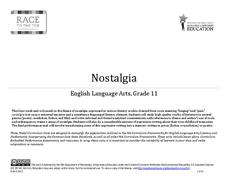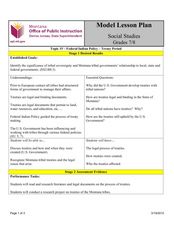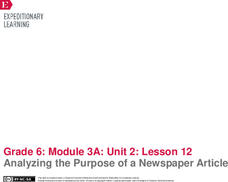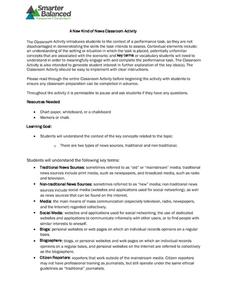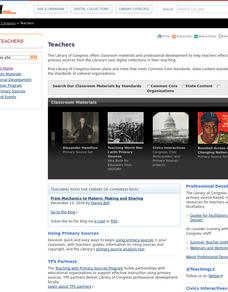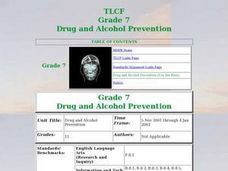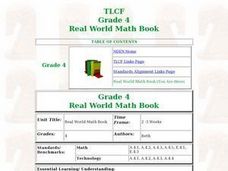Curated OER
Freshwater Fish Anatomy & Taxonomy
Tenth graders use a classification key to identify organisms. In this classification lesson students identify freshwater species of fish and document their observations.
GeorgiaStandards.org
Using Connecting Themes in First Grade Social Studies
Foster contributing members of society with a social studies unit focused on five aspects of community. First graders discuss themes of culture, groups, location, scarcity, and change with discussion questions and activities about...
Massachusetts Department of Education
Nostalgia
To prepare for crafting their own memoir, class members examine poetry by Margaret Atwood, Billy Collins, Robert Hayden, and Claude McKay, stories by Richard Rodriquez and Willa Cather, and Barry Levinson's film Avalon. They examine how...
Curated OER
Newbery Award Winners
Sixth graders select a book from the Newbery list and read it. They write a short summary of the book without giving away the ending and then research the book's author. They write a book review and, finally, incorporate all of this onto...
Curated OER
Federal Indian Policy
Students recognize the provisions of federal Indian policy. In this Federal Indian Policy lesson, students research legal documents (treaties). Students research the Montana tribes. Students answer critical thinking questions based on...
Curated OER
Government Protecting Rights
High schoolers explore tribal sovereignty. In this American Indian lesson, students learn about tribal sovereignty, watch a movie, take notes, and complete a reaction paper.
Montana Office of Public Instruction
Native American Culture: Counting, 1:1 Correspondence
Kindergarteners practice showing 1:1 correspondence while incorporating information they learned about a local Native American culture. The objects used for counting are taken from the previous day's Native American lesson. The intention...
Curated OER
States of Matter Lesson
Second graders identify the three phases of matter and demonstrate how a property can change states of matter. In this states of matter instructional activity, 2nd graders make an Ooze to discover how a solid changes into a liquid....
EngageNY
Analyzing the Purpose of a Newspaper Article
Shh! No talking during the discussion! Using the resource, scholars engage in a silent discussion called a Chalk Talk activity to analyze the purpose of a newspaper article. Additionally, they read a model newspaper article and try to...
Curated OER
The Learning Book
First graders identify, comprehend, and evaluate the content and artistic aspects of oral and visual presentations. Then they participate in formal and informal presentations and discussions of issues and ideas. Students also create...
Smarter Balanced
Aztec Empire
To set the stage for a study of the Aztec Empire, groups use the provided definition of civilization and generate a list of elements that make up our modern day civilization. The whole class then examines an image of an Aztec city and...
Smarter Balanced
Archaeological Discoveries
Artifacts, inscriptions, and monuments. Here's an activity designed to ensure that all learners are familiar with the key terms and concepts they will need to begin a study of archaeological discoveries.
Curated OER
Connecting The Dots: Activities/Interests to Careers
Second graders complete the first and second sections of the Activity Sheet "New Things To Learn and Explore." They identify the Career Path that link them to careers using the link between those activities and interests. Students think...
Smarter Balanced
A New Kind of News
Newspapers and broadcast news. Social media, blogs, and blogospheres. Class members generate a list of news sources they use to get information about events. The big idea here is to introduce the necessary vocabulary and to establish a...
Curated OER
Pass It Down
Students in varying grades work cooperatively to create a living museum of items that have been "passed down" through generations. They give a brief oral presentation showing their object (or a picture of it) and describing its history...
Curated OER
When Work is Done
Eleventh graders create an album based on a thesis statement about life in the 20th century after completing the introductory lesson for a lesson on the web site "When Work is Done".
Curated OER
The City Life or the country Life: conventions: Comparative and Superlative Forms of Adjectives and Adverbs
Reinforce knowledge of adjectives and adverbs by game playing. To better understand English conventions young writers, use flashcards to identify the base word and its comparative or superlative form.
Curated OER
Main Idea/Supporting Details Scavenger Hunt
Engage your class in a scavenger hunt to find the main ideas and supporting details in a text. They follow the teacher while s/he models how to determine main idea and find supporting details, and then they work independently. A fun way...
Curated OER
Comparing Temperatures and Latitudes
Eighth graders collect weather data from a variety of cities at the same latitudes, but on different continents. They organize data using spreadsheet program, generate graphs, and incorporate into a word processing document. Students...
Curated OER
What is Comfortable and Uncomfortable Touch?
Students fill in a worksheet that shows their ability to determine the difference between safe and unsafe touch after a counselor demonstrates with stuffed animals. They cut and paste cards that show situations and place them in the...
Curated OER
Drug and Alcohol Prevention
Seventh graders investigate the influence of alcohol and/or drugs. They prepare a written report on the chosen topic related to drugs and/or alcohol. Students utilize technology to share the information about alcohol and/or drugs with an...
Curated OER
Real World Math Book
Fourth graders create their own story problem from an idea list and solve it. They draw a picture to help in solving their problem. Students build a diorama to illustrate their story problem. They work in class to solve story problems...
Curated OER
Money Counts
Fourth graders identify bills and coins to $20 bills and make equivalencies. They organize bills and coins in groups from greatest to least and least to greatest. Students count out change.
Curated OER
Using Aphorisms to Help Dealing with People
Here's a formal plan for what many effective teachers already do: Provide a week's worth of aphorisms and have learners choose one to write about in their journals each day. They reflect on the meaning of each aphorism and project how it...




